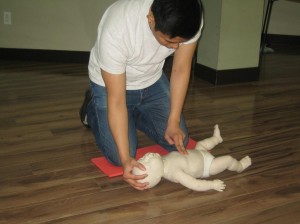Emergency first aid classes are the most popular and basic first aid classes available. This course is an 8-hour course that is normally completed within one day. Candidates will learn basic first aid and CPR techniques in this course and will have a basic understanding of the use of automated external defibrillators (AED)’s.

Canadians have a number of providers and training providers to select where to take the emergency first aid course. Candidates make sure that the course meets required government legislation. An emergency first aid course should be at least 8 hours in length and be completed in a classroom setting (not online!). The following is a list of all of the major providers of emergency first aid classes:
- St Mark James.
- Canadian Ski Patrol
- Heart and Stroke Foundation.
- St. Johns Ambulance.
Registration
To register for an emergency first aid program with the leading workplace-approved provider in your region click here.
Emergency First Aid Certification:
Once candidates complete the course they will receive a licensed and valid emergency first-aid certificate. This certificate meets legislation requirements and is valid for 3 years. Candidates will have the option of selecting the level of CPR certification that is partnered with the course. All emergency first aid certification includes training and certification in the use of automated external defibrillators.
Course Content:
workplace approved emergency first aid classes include the following course curriculum:
- Preparing to respond
- The EMS system
- Airway emergencies
- Breathing and circulation emergencies
- First aid for respiratory and cardiac emergencies
- Wound care
CPR Certification
Emergency first aid classes must be partnered with a CPR course. Candidates have the option of selecting one of the following CPR certifications:
- CPR level “A” – This is the most basic CPR training in which candidates only learn CPR techniques for adult victims.
- CPR level “C” – This is one of the most comprehensive CPR training available in which candidates learn CPR techniques for adult, child, and infant victims.
All CPR courses include training in the use of AEDs.
Course Cost:
The cost of this course depends on location, provider, and level of CPR training partnered with the course. All of the major providers and training partners have training centers located throughout Canada in every major metropolitan region. For more information and registration please contact one of the major providers.
